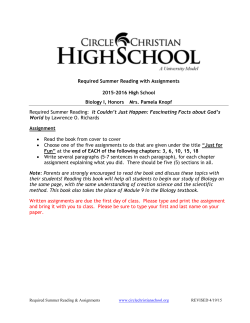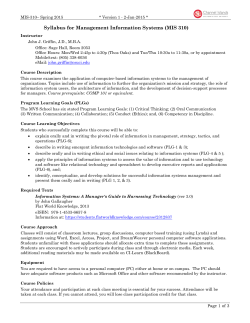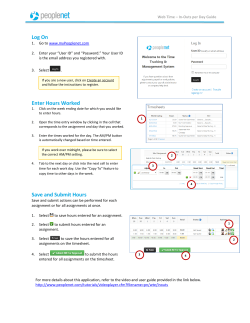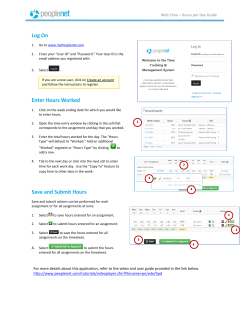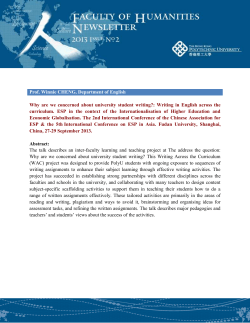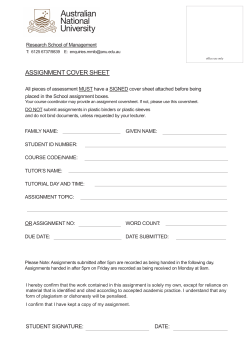
PHILOSOPHY 2033 Logic and Critical Thinking ON
PHILOSOPHY 2033 Logic and Critical Thinking ON-LINE COURSE Brian Harding, Ph.D. 709 CFO Building E-mail: Bharding@twu.edu Department phone: 940-898-2303 Office phone: 940-898-2302 Office Hours: Monday and Wednesday 12:30-2:30, Tuesday 12:00-1:00, and by appointment. Course Descriptions: The TWU course catalogue describes the course as follows: A consideration of critical thought from the perspective of induction and deduction, formal and informal fallacies, structure of syllogism, symbolic logic, and principles of scientific method. Core Objectives Evaluated in this class: Critical thinking, communication, personal responsibility and social responsibility The following measurable learning outcomes will be assessed in this class: a. Identify key movements and figures in the history of logic b. Apply the rules and methods of symbolic logic c. Identify important texts and classic works in the history of logic Texts and Readings: The readings in this course will come from two sources: 1. G. Papineau, Philosophical Devices (Oxford: Oxford UP, 2012) This text is available for purchase in the bookstore 2. S. Baronett, Logic 2nd Edition (Oxford: Oxford UP, 20113) You will need both books for this course. The Baronett book will make up the bulk of the course, and I doubt you will be able to pass the course if you do not have access to it. GRADES: Grades will be determined by a combination of tests and homework assignments, both delivered on-line There will be three tests and twenty one homework assignments. The tests will account for 60% of your grade and the homework for 40%. You may do the homework in groups if you desire, but the tests must be taken on your own! No helping each other! The homework assignments are broken up into three groups or sets. Each set is due on a specific date. Likewise there are specific days when the tests are due. Any homework assignments or tests not finished by the due date will be graded as a zero. All tests are OPEN BOOK and OPEN NOTE. They have a 1 hour and 30 minute time limit, however, so you will not be able to look up every answer at your leisure. But again, you must take the tests on your own! The homework assignments, on the other hand, have no time limits. You likewise have unlimited attempts on the homework and blackboard should take the highest grade. Keep working on them until you have a 100! TWU Attendance Policy: Consistent and attentive attendance is vital to academic success, and is expected of all students. Grades are determined by academic performance, and instructors may give students written notice that attendance related to specific classroom activities is required and will constitute a specific percentage of students' grades. Instructors are strongly encouraged to keep a record of student attendance. They should note absences due to documented student illness, serious illness or death in the student's immediate family, official school activity, state-recognized religious holiday, active military service that is of a reasonable brief duration, or other verified absences deemed appropriate by the instructor. Students must consult with instructors regarding the completion of make-up work. Absences do not exempt students from academic requirements. Excessive absences, even if documented, may result in a student failing the course. An incomplete may be granted if the student has a passing grade, but only if the instructor determines that it is feasible for the student to successfully complete remaining assignments after the semester. Pursuant to university policy, such determinations are within the discretion of the instructor. Our course is designed so that you do not have to log in at any particular day or time. In that sense, it is up to you to decide when you will ‘attend’ class by logging into Blackboard, doing the reading, assignments and viewing the power point presentations. I am able to look up how often and when you log into the course page and this information will help me determine how much extra help to give you. If you rarely log in, I will be less helpful to you than to students who regularly log in to the course page. There will also be a discussion board set up for you to chat with each other about logic. Late and Incomplete Work: It is not the responsibility of the professor to track down students who have missed lectures or tests. Tests that are missed without prior consultation with the professor cannot be retaken. Let me emphasize this: If you miss a test, and have not contacted me before hand, you cannot make up that grade; it is averaged as a zero!!! The students should take it upon themselves to acquire notes for missed classes from another student. HOMEWORK SETS MUST BE TURNED IN ON TIME. NO EXCUSES. IF IT IS NOT TURNED IN ON TIME, IT IS GRADED AS A ZERO. The due dates for the homework sets are given both on the syllabus and on Blackboard. The due dates for the homework sets are staggered. They are due in ‘bunches’ and each bunch is due at a certain time, indicated on the syllabus. You have an unlimited number of attempts on the homework, so long as they are turned in on time. The computer should take the highest grade, let me know if it does not. Regarding grades for the course, a grade of „incomplete” (I) will not be given unless the student fills out a form (not an e-mail!!) containing a written request for the incomplete, an explanation of why the incomplete is desired and finally, a proposed deadline for the completion of the incomplete work. Academic Honesty: Honesty in completing assignments is essential to the mission of the university and to the development of the personal integrity of the student. Cheating, plagiarism, or other kinds of academic dishonesty will not be tolerated and will result in appropriate sanctions that may include failing an assignment, failing the class, or being suspended or expelled. Suspected cases in this course may be reported to Student Life. The specific disciplinary process for academic dishonesty is found in the TWU Student Handbook. Tools to help you avoid plagiarism are available through the TWU Libraries at http://www.twu.edu/library/res/res_plagiarism.htm. How to E-mail the Professor Standard professional e-mail etiquette applies. This means to treat e-mails as much like a standard business letter as possible given the electronic format. E-mails should include a salutation (Dear Professor…) and a signature line (Sincerely, Jane Doe, Philosophy 2033). The body of the text should be written politely, with proper grammar and spelling. Above all, avoid text-message style abbreviations. When asking about a question from the review sheet, the student should type out the entire question and not merely the question number. I will not respond to e-mails that fail to fit this format. When asking about a question from the review sheet, the student should type out the entire question and not merely the question number. The student must also include their answers to the review sheet with their questions. I will not assist the student unless there is evidence that the entire review sheet has been completed. Students with Disabilities If you anticipate the need for reasonable accommodations to meet the requirements of this course, you must register with the office of Disability Support Services (CFO 106, 940-898-3835, dss@twu.edu) in order to obtain the required official notification of your accommodation needs. Please plan to meet with me by appointment or during office hours to discuss approved accommodations and how my course requirements or activities may impact your ability to fully participate. ISSUES PERTAININT TO ON-LINE COURSES Because this is a 100% on-line course, it has certain characteristics that differentiate it from more traditional course work. First of all, there is no need for you to come to campus for this course. Every assignment will be given on-line thought the blackboard site. Likewise, instead of in-class lectures, our ‘class time’ will be made up of power point slides and the like. Because of this, there is no set class time – you can access the slides any time day or night. However, there are some key dates (when tests and homework assignments are due) that you must keep in mind! Because of this, it is important that you exercise self-discipline to ensure that you keep up with the work and complete assignments on time. Tests will be open book and open note, but will have a time limit on them. If technical difficulties arise during test taking (i.e. your computer crashes) contact me as soon as possible to make other arrangements. Also, there is no way I can tell whether or not you are understanding the material unless you tell me. If you have problems understanding logic, let me know ASAP. Most misunderstandings can be cleared up easily in office hours, if we get to them soon enough. But if you let the misunderstanding simmer for weeks or months, it will form a scar! In the suggested schedule that follows this page, I break up the class into weeks (identified by the first Monday of the week). A section of the book(s) is identified for that week. The power point presentations correspond with chapter and section divisions in the assigned text books. This is because you should be both doing the reading and viewing the power points. One without the other will not suffice to pass the class! There will also be discussion forums available on blackboard; while you are not required to use them, they will be available. KEY DATES (Deadlines) Friday February 27: HW SET ONE Monday March 2: TEST ONE Friday April 3: HW SET TWO Monday April 6: TEST TWO Friday May 1: TEST THREE & HW SET THREE SCHEDULE Week of 12-Jan Week of 19-Jan Week of 26-Jan Week of 2-Feb Week of 9-Feb Week of 16-Feb Week of 23-Feb Friday Feb 27 Monday March 2nd. Week of 9-Mar Week of 16-Mar Week of 23-Mar Week of 30-Mar Friday April 3 Monday April 6th Week of 13-Apr Week of 20-Apr Week of 27-Apr Friday May 1st First day of classes Logic, Chapter 1, A-D Martin Luther King day Logic, Chapter 1, E-G Logic, Chapter 7, A Logic, Chapter 7,B-C Logic, Chapter 7,D Logic, Chapter 7,E-G Logic, Chapter 7, H-I Logic, Chapter 8, A Logic, Chapter 8, B-C Logic, Chapter 8,D Logic, Chapter 8,E-F Logic, Chapter 8, G-H HW SET ONE is Due TEST ONE is due Logic, Chapter 9, A Logic, Chapter 9, B Logic, Chapter 9, C Spring Break Spring Break Logic, Chapter 9, D Logic, Chapter 9, E Logic, Chapter 9, F Logic, Chapter 9, G HW SET TWO is DUE TEST TWO is due Phil. Devices, Ch 1. Phil. Devices, Ch 2. Phil. Devices, Ch.3 Phil . Devices, Ch.4 Phil. Devices, Ch.5. Phil. Devices, Ch.6 HW SET THREE AND TEST THREE ARE DUE
© Copyright 2025

